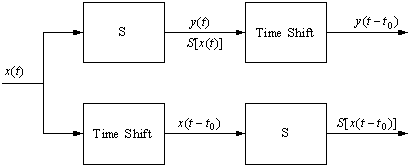
Given a system that is time-invariant, if the input signal is shifted in time, all that will happen is the output signal will be shifted by the same amount in time. It will not change in any other way. An alternative way to state this is that the system does not change over time. It will perform the same today as it would next week.

If y(t - t0) = S[x(t - t0] (i.e. the outputs of both branches of the above block diagram are equal), then the system is Time-Invariant. This means that the system is not changing with time.
If y(t - t0) ≠ S[x(t - t0] (the outputs of both branches of the above block diagram are different), the system is Time-Varying. This means that the system will perform differently depending on when you use it.
Example 11 Is a capacitor time-invariant?
![]()
compare Vc(t - t0) with S[i(t - t0)]:
Example 12 Resistor v(t) = i(t)R. Is this Time-Invariant?
Example 13
y(t) = t x(t)
Is this Time-Invariant?
Example 14 Time Reversal
y(t) = x(-t)
Is this Time-Invariant?
Example 15 Test the following systems for time-invariance:
![]()
![]()
a(t) = sin[x(t)]
b(t) = sin(t)x(t)
w(t) = x(2t)
![]()